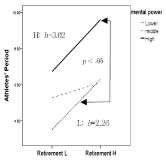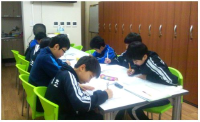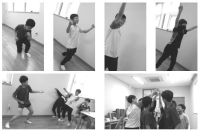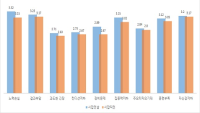
This study aimed to explore the psychological factors affecting sports performance and their purposes as perceived by adolescent athletes. Study data were collected by conducting an open-ended survey with 232 student athletes from adolescent athletes in S city. The collected data were categorized using content analysis, which was conducted twice to explore the psychological factors affecting sports performance and their purposes. From 537 answers, 30 performance-affecting psychological factors—including confidence, endurance, effort/dedication, optimal tension, and social support—were identified, and they were classified into five categories: psychological fundamental, mental toughness, motivation, emotional stability, and social relationships. From 588 answers, the purposes of the psychological factors were identified, including performance achievement, motivation enhancement, demonstrating mental toughness, cognitive strategy, confidence increase, emotional regulation, injury prevention, game strategy, and reinforcement cohesion. These performance-affecting psychological factors and their purposes may serve as a reference to understand how secondary school students perceive the relationships among various psychological factors and the relationship between the psychological factors and performance. This study is expected to inform goal setting and content organization in psychological skills training.


Purpose The purpose of this study was to compare the differences between the three simple control models of Hayes (2012) and to determine whether there were Moderating Effects depending on the level of self-esteem, willpower and belief that are psychological factors in the relationship between athlete's retirement and Athlete's period. Methods To achieve this objective, a total of 259 retirees were collected from data on retirement and psychological factors. The data processing method presented the reliability and feasibility of the measuring instrument through technical statistics, frequency analysis, confirmation factor analysis, and reliability analysis. In addition, we conducted a hierarchical regression analysis using the PROCESS command statement in IBM 20 to examine the regulatory effects. Results The results of the study are as follows: The first was the significant model of Hayes (2012)'s three simple control models. It is up to the researcher to choose which model to choose, but when selecting the model, the justification of the variables must be established on the basis of theoretical basis, and the reliability of the variables must be put in to produce reliable and reasonable results. The second was to verify that the relationship between the retirement factor(10) and the Athlete's period has an adjustment effect based on self-esteem, willpower and belief. Among the psychological factors, the Moderating Effects was greatest in the influence of belief on the Athletes' period, and the more reasons for retirement, the longer the Athletes' period than the weaker. The combined mental strength of all three psychological factors combined shows that the combined effect of control also significantly increases the player's ability to survive by combining with the retirement factor. In particular, sportsmanship has resulted in a better mix of retirement factors than the sense of Self-esteem and will, resulting in a longer increase in the capacity. Conclusions Therefore, players who long for a player always keep their dreams of becoming a big star in mind, and ask me to always keep the belief in hope that I will enjoy my career for a long time.







PURPOSE This study was conducted to estimate the tendency of psychological factors influencing cycling performance by analyzing the characteristic factors of athlete reputation in the news big-data. METHODS To explore the psychological factors influencing cycling performance, an open questionnaire was conducted on 82 cyclists, and Inductive Content Analyses was performed. Overall, 89,520 news articles were collected through BIGKinds, and forming factors of athlete reputation were derived through LDA topic modeling analysis and inductive categorization. Through regression analysis, time series tendency of the factors of athlete reputation was calculated. Finally, the tendency of psychological factors to influence cycling performance was estimated based on the previously derived results in this study. RESULTS The psychological factors influencing cycling performance were found to be; emotion control, trust capital, cognitive control, motivation and communications with the coach. The forming factors of athlete reputation was found to be; reporting of the sports event, infrastructure creation, analysis to performance, moral issue, social environmental changes and sports gossip. The time series tendency of the forming factors of athlete reputation was found to include the categories of Hot, Warm, Cool and Cold. The psychological factors influencing cycling performance are estimated to expand to exercise performance and moral intelligence. CONCLUSIONS The results of this study suggest that the discussion of psychological factors influencing cycling performance extends not only to exercise performance, but also to moral intelligence, reflecting the socio-cultural context in the discussion of performance.
This study was to explore the factors influencing Olympic performance positively and negatively. In order to achieve this purpose, 60 athletes, who participated in 2012 London Olympic games, responded on open-ended questionnaire. In addition, 10 athletes, who won medals in London Olympic, responded on in-depth interview. Collected data were analyzed by deductive content analysis. The results of this study were as follows: firstly, the factors influencing Olympic performance positively were psychological preparation, strengthening training, physical conditioning, support from significant others, material support, cheering of Korean people, self respect as a Korean national athlete, different game environment, team cohesion, sharing Olympic experience, and support of sports science. Secondly, the factors influencing Olympic performance negatively were psychological pressure, excessive expectation, negative interpersonal relationship, condition decline, overtraining, unstable environment, insufficient facilitation, decrease in performance level, and especially ineffective village room placement and media management during Olympic period. Thirdly, the differences between Olympic games and other world competitions , perceived by athletes were competition scale, psychological attitude, training support, systematic preparation, and benefits from winning medals. The results of this study will give fundamental information in developing a scale which can measure Olympic preparation level and in developing Olympic preparation guideline. Therefore, it will help athletes ,who participate Olympic for the first time or athletes who did not perform well in pre-participated Olympic games, to understand and apply in training the factors influencing Olympic performance and help them to perform better in Olympic games.
PURPOSE This study aimed to extract football coaches’ categories of performance evaluation factors (PEF) and examine the reflective characteristics of the football coaches’ player and casting judgments. METHODS PEF were extracted through an open-ended questionnaire and categorization from 80 AFC C or higher football coaches. Reflection was calculated in player and casting judgments through an analytic hierarchy process. The difference between the football coaches’ player and casting judgments was examined using SPSS 21.0. RESULTS First, the PEF of football coaches were categorized into four general categories: physical intelligence, psychological intelligence, growth potential, and competition intelligence. Second, the importance of football coaches’ player judgments were reflected by the PEF as football intelligence, situation judgment, football talent, tactical understanding, tactical operation, etc. The importance of the casting judgment were reflected by the PEF as tactical understanding, mediative skills, fitness, tactical operation, situation judgment, etc. Third, a statistically significant difference was noted between player and casting judgments. Football coaches tended to value growth potential and talent as sub-factors in the player evaluations. Football coaches’ PEF were aligned with the importance of player and casting judgments in psychological and competition intelligence as sub-factors such as skills, physical, attitude, passion, etc., but differed from physical intelligence and growth potential as sub-factors including mediative skills, physical, football talent, and tactical understanding. CONCLUSIONS In the football coaches’ player evaluations, the idealistic principle centered on growth potential. However, in the casting evaluation, the realistic principle centered on victory takes effect.

The purpose of this study was to verify the effect on elementary school students in the exercise start stage by performing a sport psychological skill training to improvement of psychological skill and life skill. Participants were eight elementary school boys volleyball player. The program consisted of psychological skills and life skills in educational counseling model of Visek et al(2009). It was conducted 40-50 minutes a session in total for 22 sessions. Data was collected through a psychological test, worksheet and participant observation, in-depth interviews. The collected data was analyzed to verify difference by paird t-test after pre-middle-post test and to extract meaningful data category. Quantity analysis showed that a result of sport psychological skill test proved a significant difference in willingness to overcome, confidence, concentration, anxiety regulation. Life skill test were no significant differences in all factors. However, the rise of scores was observed on result of the pre-middle paired t-test of life skill during season. Quality analysis showed possibility of goal setting, concentration on the routine, decrease of competitive anxiety, increase of positive thinking, self-understanding and understanding of others, promotion of communication among team members. This sport psychology skill training had a significant effect on the psychological skills of elementary players change. But it seems to be necessary life skills in a more through review of the information.



The purpose of this study was to examine psychological capital acquisition through Asian Games Participation. 17 of national women football players were completed Psychological Capitals Questionnair. The psychological capital consists of optimism, psychological skills, self-management, collective efficacy, and performance perception was investigated after the team call-ups and before the team-release. The data was analyzed by paired t-test. As results, Korean women football players’ collective efficient and performance perception showed a statistical significance at the beginning of the team call-ups but optimism, psychological skills, and self-direction did not show statistic significances. The team-harmony, interpersonal-management, team-power, sufficient training, trust in coach, efficient communication, and psychological football factors, which were subfactor of football players’ psychological capital, showed statistical significances. However, confidence, concentration, goal-setting, imagery, willpower, anxiety-control, mental-management, life-management, training-management, innate-behavior management, physical-management, football skills, mediative skills, and football intelligence factors did not have statistic significances. These results demonstrate that effects of mega sporting events-like experiences and psychological factors’ variability and inflexibility according to weather changes should be considered when it comes to discussion of psychological factors regarding players’ performance. It is expected that this study would be a fundamental resource for understanding of psychological influences through participations in mega sporting events and discussions about further psychological interventions for teams with environmental consideration as well as methodological developments which could measure effects of the psychological interventions.

[Purpose] This study was designed to explore Yuna Kim’s psychological strengths and the contextual factors, which led her to obtain the gold medal and the reflection of peak performance and preparation at the 2010 Olympics. It was hoped that by sharing the experience of one of the top athletes, other athletes would learn from her and prepare themselves better for Olympics in the future. [Methods] A case study method was applied with a qualitative approach. To obtain the purpose of the study, five in-depth interview sessions including introductory and member checking procedures were conducted. The interviews were recoded and transcribed verbatim, and content analysis was used to inductively analyse the data. [Results] The four general dimensions that were discovered in the results included Social-external Factors, Personal Traits, Coping Strategies, and Peak Performance. The social-external factors consisted of social support and attached/detached relationships while personal traits were personality traits, confidence and motivation. Coping strategies to overcome external and situational pressures were detached coping and resilience whereas peak performance was reflected on flow and the state of being mindful. [Conclusion] In conclusion, Yuna Kim’s strength was parallel with the previous research on the top athletes and other findings such as adaptive perfectionism and a sense of rivalry in the research were discussed.


Purpose The purpose of this study was to provide useful information on the improvement of performance by measured the psychological-physiological stresses experienced by elite shooters during a competition. Methods Thirty-eight elite shooters participated in this study (Male = 13, Female = 25). Psychological stress was measured and used for this study based on the stress factors found in the elite target stress study by Park(2015). The cortisol, a physiological stress hormone, was measured using saliva. Results The reliability of the psychological stress sub-factor pre-post analysis results showed no statistically significant. The concentration of cortisol measured on the day before the competition (0.1704 µg/dL) significantly increased immediately before the competition (0.3558 µg/dL). Cortisol immediately before the competition showed negative correlation (r=-.361, p=.036) with the competition score, and the regression variable of cortisol was 13%. Conclusions In this study, physiological stress had a negative effect on elite shooters performance compared to psychological stress.




Purpose The purpose of this study was to investigate the badminton players psychological disturbance and coping strategies types and characteristics. Methods To achieve the purpose of this study, an open-ended questionnaires were used targeting 194 badminton players, 25 Q samples were selected by collected data as the self – statement. Q samples were classified depending on their subjective experience by P samples composed of active badminton players who had more than eight years of athletic career; this data were coded and analyzed by VARIMAX rotation. Results The results revealed by the Q methodology were below. First of all, the first type is named as (Internal Disturbance - Passive Coping) type. The first type is psychologically disturbed by internal factors, and negative about external coping strategies. Second, the second type showed the higher awareness of coping strategies than the other types; It was named as (Active Coping) type. Third, The third type recognized the burden of victory and self-confidence, and it was named as the type of (Victory Obsession). Conclusion In the badminton competition, the deterioration of concentration and judgment ability because of psychological disturbance has a serious effect on the performance. Therefore, based on the results of this study, it will be possible to improve the performance by appropriate psychological intervention through the characteristics of the athletes.

